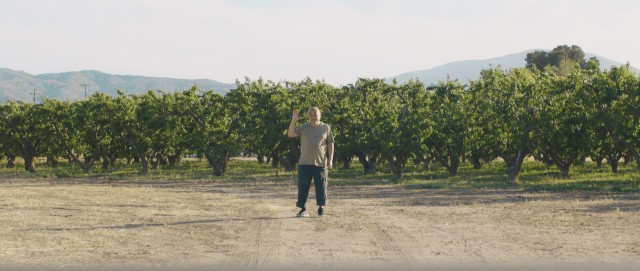“Dad, I’m home,” are the first words we hear in Kelly Yu’s tender father-son portrait, Plum Town. A wistful violin ebbs over windswept countryside, flows through a distant mountain range, and ultimately brings us to a vibrant plum farm. We’re only a few frames in but Yu already has me. I am captivated by this besuited son’s homecoming and enthralled with his ruggedly earnest father. A frog rises in my throat because even though this film is about a Chinese family told entirely in Mandarin, I feel nostalgic for a place I’ve never been, for foods I’ve never eaten, and for people I’ve never known.
Splat! An unassuming fly is smashed, and it’s back to the story. Xiao Li and Old Li, played with striking vulnerability by Jeff Chen (Kiss of the Rabbit God) and Richard Ouyang, catch-up with one another over a dish of steamed Baozi. One man is the inverse of the other: Xiao Li sitting stiffly clad in an expensive suit, Old Li at ease in his wellworn t-shirt and shorts. This juxtaposition will continue throughout the film, but for now the two talk of the plum orchard, a prospective factory, and Xiao Li’s gluten allergy which renders him unable to enjoy the food he has eaten since childhood. With every sentence, their relationship gains clarity and finally comes into full resolve when Xiao Li orders takeout Sushi from his smartphone. There is a gulf between these two. Plum Town is their odyssey back to each other.

Richard Ouyang as Old Li in Kelly Yu’s Plum Town
Whether the two are sharing a cigarette, singing karaoke, or talking over a platter of lackluster sushi (especially when compared to the succulent Baozi), one thing is clear: Plum Town is a talkie done right. This is no easy feat. The performances must be finely tuned, the camera intuitive yet precise, the dialogue both compelling and propulsive. Yu strikes the balance with cinematographer Philips Shum and finds the pace with editor Stephen Pfeil. Andrew Morgan Smith’s score whispers and suggests, symbolic of Xiao Li’s own dawning appreciation for his father, and all he has sacrificed. These pitch-perfect elements join together in harmony, singing in the impressively immersive world created by production designer Yudi Zhang and art director Justine Chen (which was actually the Los Angeles duplex of producer, Jean Liu). With such exactitude from her collaborators, it is obvious Yu has a firm grasp on the thing which can elude even the most seasoned of directors: a voice, powerful and assured.
“As long as they still stand, so does our family history”
Family, heritage, the older generation and the next. The thematics at play in Plum Town are not only lofty but deeply personal to Yu. Her father grew up in the Chinese countryside to a family of farmers. When Yu returned to her roots in 2019, she discovered her relatives no longer farmed, as they had sold their land to a corporation who had since built a factory in its spot. When Yu asked her grandfather how he felt about this change he took her to a swath of plum trees and told her, “those were planted by my grandfather. As long as they still stand, so does our family history”. When I read this testimony from Yu, the frog in my throat rose all over again. What profound words those are and how glad I am she has shared them with us. As an artist and filmmaker, getting personal can be the hardest work of all. Hard as it is, this work bears fruit just like the trees in Old Li’s orchard.
Carefully and lovingly coded within Plum Town is a message we could all benefit to hear. How does one move forward? How do we embrace our future and the change that inevitably comes? It starts by honoring the past. Yu has done this and more. She inspires me to reconsider my own as I toggle back the dial and watch Plum Town again and again and again.

 Lorraine Caffery
Lorraine Caffery